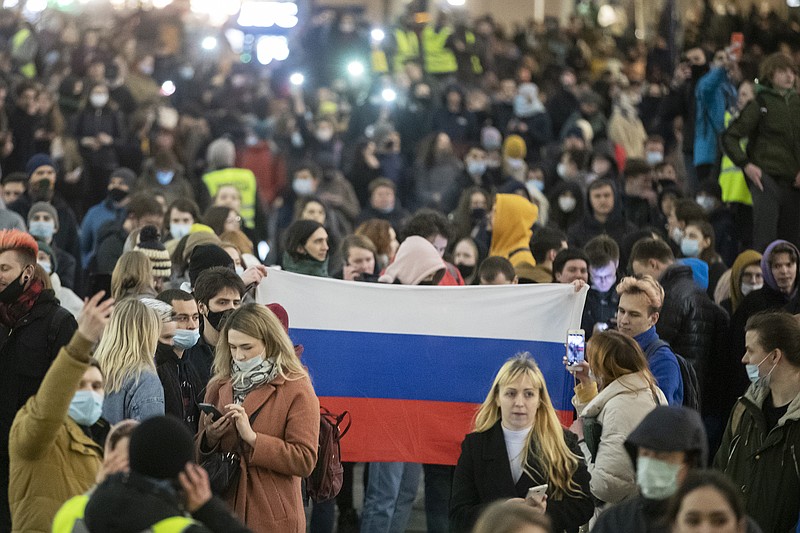MOSCOW — Thousands of supporters of imprisoned Russian opposition leader Alexei Navalny crowded into central Moscow on Wednesday as part of nationwide demonstrations calling for his freedom as his health reportedly is in severe decline while on a hunger strike.
Nearly 1,500 people were arrested across the country in connection with the protests, according to a human rights group that monitors political repression. Many were seized before the protests even began, including two top Navalny associates in Moscow.
Navalny’s team called for the unsanctioned demonstrations after weekend reports that his health is deteriorating.
“The situation with Alexei is indeed critical, and so we moved up the day of the mass protests,” Vladimir Ashurkov, a Navalny ally and executive director of the Foundation for Fighting Corruption, told The Associated Press. “Alexei’s health has sharply deteriorated, and he is in a rather critical condition. Doctors are saying that judging by his test [results], he should be admitted into intensive care.” Navalny’s organization called for the Moscow protesters to assemble on Manezh Square, just outside the Kremlin walls, but police blocked it off. Instead, a large crowd gathered at the nearby Russian State Library and another lined Tverskaya Street, a main avenue that leads to the square.
[Video not showing up above? Click here to watch » https://www.youtube.com/watch?v=DcpS_GsVSpk]
In St. Petersburg, police blocked off Palace Square, the vast space outside the Hermitage museum and protesters instead crowded along nearby Nevsky Prospekt.
It was unclear whether the demonstrations would match the size and intensity of nationwide protests that broke out in January after Navalny, President Vladimir Putin’s most prominent opponent, was arrested. Turnout estimates varied widely: Moscow police said 6,000 people demonstrated in the capital, while an observer told Navalny’s YouTube channel that the crowd was about 60,000.
The OVD-Info group reported 1,496 arrests in 82 cities.
Navalny’s team called the nationwide protests for the same day that Putin gave his annual state-of-the-nation address. In his speech, he denounced foreign governments’ alleged attempts to impose their will on Russia. Putin, who never publicly uses Navalny’s name, did not specify to whom the denunciation referred, but Western governments have been harshly critical of Navalny’s treatment and have called for his release.
In Moscow, Navalny spokeswoman Kira Yarmysh and Lyubov Sobol, one of his most prominent associates, were detained by police in the morning.
Yarmysh, who was put under house arrest after the January protests, was detained outside her apartment building when she went out during the one hour she is allowed to leave, said her lawyer, Veronika Polyakova. She was taken to a police station and charged with organizing an illegal gathering.
Sobol was removed from a taxi by uniformed police, said her lawyer, Vladimir Voronin.
In St. Petersburg, the State University of Aerospace Instrumentation posted a notice warning that students participating in unauthorized demonstrations could be expelled.
Navalny, 44, was arrested in January upon his return from Germany, where he had spent five months recovering from a nerve agent poisoning he blames on the Kremlin. Russian officials have rejected the accusation.
Soon after, a court found that Navalny’s long stay in Germany violated the terms of a suspended sentence he was handed for a 2014 embezzlement conviction and ordered him to serve 2½ years in prison.
Navalny began the hunger strike to protest prison officials’ refusal to let his doctors visit when he began experiencing severe back pain and a loss of feeling in his legs. The penitentiary service has said Navalny was getting all the medical help he needs.
On Sunday, he was transferred to a hospital in another prison and given a glucose drip. Prison officials rebuffed attempts by his doctors to visit him there.
Information for this article was contributed by Irina Titova of The Associated Press.
